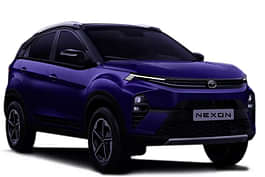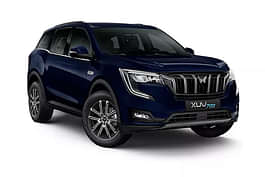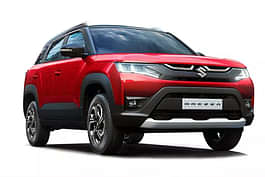
KEY HIGHLIGHTS
- Battery EVs are powered by electricity alone, while hybrid EVs have a gasoline engine that helps to extend the range
- Battery EVs have a longer electric range than hybrid EVs, but they are also more expensive
- Hybrid EVs have a higher upfront cost than traditional gasoline cars, but they can save money on fuel over the long term
The electric vehicle (EV) market is growing rapidly, and there are now many different types of EVs to choose from. Two of the most popular types of EVs are battery EVs (BEVs) and hybrid EVs (HEVs).
BEVs are powered entirely by electricity, while HEVs have a gasoline engine that can also power the car. This gives HEVs a longer range than BEVs, but it also means that they don't get as good fuel economy as BEVs when they are running on electricity alone. So, which type of EV is right for you? Here is a brief overview of the pros and cons of BEVs and HEVs to help you make a decision.
Pros and cons of battery EVs
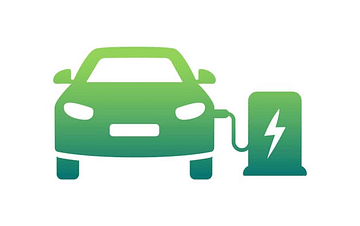
| Pros of Battery EVs | Cons of Battery EVs |
|---|---|
| Environmental Friendliness: Battery EVs produce zero tailpipe emissions, which means they don't release harmful pollutants into the air. This helps reduce air pollution and combat climate change. | Limited Driving Range: EVs typically have a shorter driving range compared to traditional gasoline vehicles. It means you may need to charge your EV more often or plan your trips carefully for longer journeys. |
| Lower Operating Costs: EVs can save you money in the long run. Charging an EV with electricity is generally cheaper than filling up a gasoline vehicle with fuel. Moreover, EVs have fewer moving parts, which means they require less maintenance and can save you on repair costs. | Charging Infrastructure: The availability of charging stations can be limited in some areas, especially in rural or remote locations. It might be a challenge to find a charging point when you need one, so you need to plan your charging stops in advance. |
| Quiet and Smooth Ride: EVs are known for their quiet operation. Since they don't have a traditional engine, they produce less noise and vibrations. This can make your driving experience more peaceful and enjoyable. Additionally, EVs provide instant torque, which means they can accelerate quickly and offer a smooth ride. | Longer Refueling Time: Charging an EV takes longer compared to filling up a gasoline vehicle. Even with fast chargers, it can still take a significant amount of time to charge your EV fully. This means you need to plan for longer charging breaks during road trips. |
| Government Incentives: Many governments provide incentives to encourage the adoption of EVs. These incentives can include tax credits, rebates, or subsidies, which can make purchasing an EV more affordable for consumers. | Limited Model Variety: The variety of EV models available in the market is still limited compared to gasoline vehicles. This means you might have fewer options to choose from in terms of vehicle types, sizes, or features. However, the variety is increasing as EVs gain popularity. |
| Energy Independence: With an EV, you have the option to power your vehicle with renewable energy sources like solar or wind power. This promotes energy independence, reduces reliance on fossil fuels, and helps create a more sustainable future. | Upfront Cost: EVs generally have a higher upfront cost compared to gasoline vehicles. While the price is gradually decreasing, the initial purchase cost can still be a barrier for some buyers. However, savings on fuel and maintenance costs can help offset this over time. |
| Instant Torque: EVs deliver power to the wheels more efficiently compared to traditional vehicles, providing instant torque. It means you can enjoy quick acceleration and responsive driving, making EVs fun to drive. | Battery Degradation: Over time, the performance and range of EVs can be affected by battery degradation. Batteries gradually lose their ability to hold a charge, which can result in reduced driving range. However, advancements in battery technology are addressing this issue. |
| Health Benefits: EVs contribute to better air quality, reducing harmful emissions that can cause respiratory problems and other health issues. This can lead to improved public health outcomes and reduced healthcare costs. | Weight and Space Constraints: EV batteries are heavier and bulkier than gasoline tanks, which can impact vehicle weight distribution, cargo space, and overall design flexibility. |
| Safety Features: EVs often come equipped with advanced safety features. These can include features like regenerative braking, which helps in maintaining control and reducing wear on the brake pads. Additionally, EVs tend to have a lower center of gravity, enhancing stability and reducing the risk of rollovers. | Limited Public Charging Infrastructure: While the number of public charging stations is increasing, there might still be a lack of charging infrastructure in some areas. This could make |
| Reduced Noise Pollution: Battery EVs contribute to quieter neighborhoods and urban areas, as they generate less noise compared to vehicles with internal combustion engines, making for a more peaceful environment. | Range Anxiety: Concerns about running out of battery power, commonly known as "range anxiety," may |
Also Read : Hybrid Petrol vs Diesel Engine - Which One Is The Best?
Pros and cons of hybrid EVs
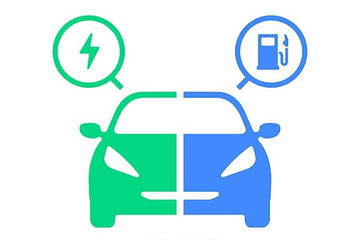
| Pros of Hybrid EVs | Cons of Hybrid EVs |
|---|---|
| 1. Fuel Efficiency: Hybrid EVs use a combination of an internal combustion engine and an electric motor, which means they can go further on less fuel compared to regular cars. This helps you save money at the pump. | 1. Higher Cost: Hybrid EVs tend to be more expensive to buy upfront compared to regular cars. However, you may save money in the long run due to reduced fuel consumption. |
| 2. Reduced Emissions: Hybrid EVs produce fewer harmful emissions, such as carbon dioxide and pollutants that contribute to air pollution and climate change. By driving a hybrid, you can contribute to a cleaner and healthier environment. | 2. Limited Electric Range: Hybrid EVs can only run on electricity for a limited distance before they switch to using gasoline. This means you may need to refuel more often for longer trips, which can be inconvenient. |
| 3. Regenerative Braking: Hybrid EVs use a clever technology called regenerative braking. When you brake or coast, the car's electric motor captures some of the energy that would otherwise be wasted and uses it to recharge the battery. This helps improve efficiency and extend the overall range of the vehicle. | 3. Complex Systems: Hybrid EVs have more complex parts and systems compared to regular cars, which can make repairs and maintenance more expensive. It's important to find a reliable mechanic who understands hybrid technology. |
| 4. Lower Dependence on Fossil Fuels: Hybrid EVs rely on both gasoline and electricity to operate. By using less gasoline, you help reduce our dependence on fossil fuels, which are limited resources and contribute to greenhouse gas emissions. | 4. Limited Charging Infrastructure: Hybrid EVs require access to charging stations for their electric components and gasoline stations for refueling. In some areas, charging infrastructure may be limited or not readily available, which can be an inconvenience. |
| 5. Silent Operation: When driving at low speeds or in electric mode, hybrid EVs are much quieter compared to regular cars. This makes for a more peaceful and enjoyable driving experience, especially in busy urban areas. | 5. Less Power than Conventional Vehicles: Hybrid EVs typically have less power and may feel less peppy during acceleration compared to regular cars. This trade-off is made to prioritize fuel efficiency and environmental friendliness. |
| 6. Government Incentives: Depending on where you live, there may be government incentives and tax credits available for purchasing a hybrid EV. These incentives can help reduce the overall cost of the vehicle and make it more affordable. | 6. Battery Replacement Cost: The battery in a hybrid EV will eventually need to be replaced, and the cost of a new battery can be significant. However, battery technology is improving, and prices are gradually coming down. |
How to choose between a BEV and a HEV
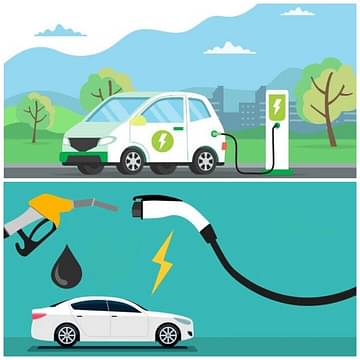
How far you usually drive:
Think about your daily driving distance. If you mostly drive short distances, like going to work and running errands nearby, a BEV might be a good fit because it runs on electricity and doesn't emit pollution. But if you often take longer trips or there aren't many places to charge an electric car where you live, an HEV could be more practical since it can go longer distances without needing to charge.
Helping the environment:
If you want to reduce your impact on the environment, a BEV is a greener choice. It doesn't produce any tailpipe emissions, which means it helps keep the air cleaner and reduces climate change. HEVs are cleaner than regular cars, but they still use gasoline and emit some pollution.
Finding places to charge:
Consider if there are places to charge an electric car near your home or work. BEVs need charging stations to recharge, so it's important to have easy access to places where you can plug in your car. With an HEV, you can refuel at regular gas stations, which are more common.
Cost and saving money:
BEVs usually cost more upfront than HEVs. Think about your budget and whether the potential savings on fuel and any government incentives for BEVs will make up for the higher initial price in the long run. HEVs are often more affordable to buy and still save money on fuel compared to regular cars.
Maintenance and repairs:
BEVs have fewer parts and require less maintenance compared to cars with regular engines. HEVs have both an electric motor and a regular engine, which means they can be slightly more expensive to maintain and repair. Think about the long-term costs of keeping the car in good shape.
Driving experience:
BEVs often provide a smooth and quiet ride because they use electric motors. They also have quick acceleration. HEVs drive more like regular cars, though they are not as powerful as regular cars. With an HEV, you don't have to stop to charge during long trips.
Types of available cars:
Check what types of BEVs and HEVs are available. The options and variety of models may vary, so look into different models and see which ones suit your preferences and needs.
Verdict
The best type of EV for you will depend on your individual needs and preferences. If you want the longest possible range and don't mind the longer charging times, then a BEV is a good option. If you want a more affordable EV with a shorter range, then a HEV is a good option. Ultimately, the best way to decide which type of EV is right for you is to test drive a few different models and see which one you like the best. You can join our 91Wheels Whatsapp Group for all of such latest updates from the automotive industry.
Also Read : Do You Want To Buy An Electric Vehicle? Know The Pros And Cons Of EVs


